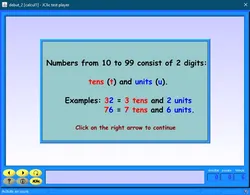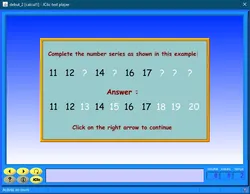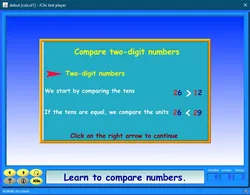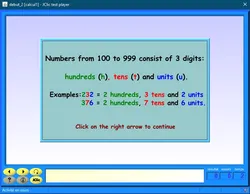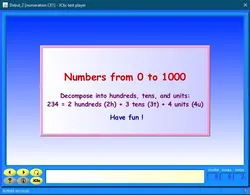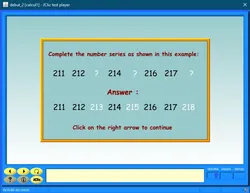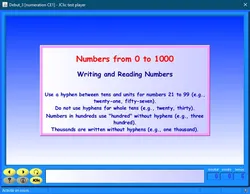Number Activities for Grade 2 Students
Interactive Number Activities for Grade 2 Students
Welcome to our selection of engaging online math exercises designed to help Grade 2 students deepen their understanding of number decomposition, ordering, and comparison. These activities also support the transition from basic counting skills to more complex tasks, such as breaking down two- and three-digit numbers, completing ascending sequences, and mastering comparison symbols. Students will interact with numbers up to 999 through a variety of methods—typing answers, selecting numbers with a mouse, or dragging and dropping.
Exercise 1: Decomposing Two-Digit Numbers (10 to 99)
Focus: Learning to break down two-digit numbers into tens and units.
- Type in the Components: For each given number (e.g., 32), students type the correct number of tens and units.
- Reconstructing the Number: Given a decomposition like "8 tens + 4 units," the student must type the original number (84).
- Summation of Tens and Units: Students also practice recognizing sums expressed as tens and units (e.g., 10 + 10 + 10 + 5 = 35).
Exercise 2: Completing Ascending Sequences (0 to 99)
Focus: Filling in missing numbers in ascending sequences.
- Seven-number sequences are presented, with some numbers missing.
- Students can either type the missing numbers or choose from multiple-choice options displayed on the screen.
- With 10 different sequences to solve, this exercise builds confidence in number order and counting skills.
Exercise 3: Comparing Two-Digit Numbers (10 to 99)
Focus: Using comparison symbols (>, <, =) to compare two-digit numbers.
- Symbol Placement: Four pairs of two-digit numbers are shown with an empty box between them. Students click the correct symbol and then place it in the box. Immediate feedback is provided for incorrect placements.
- Fill-in-the-Blank Equations: Students see equations like "5 > ?" and must choose the correct missing number from four options.
Exercise 4: Decomposing Three-Digit Numbers (100 to 999)
Focus: Breaking down three-digit numbers into hundreds, tens, and units.
- Type in the Components: For a displayed number (e.g., 132), students type the correct hundreds, tens, and units.
- Reconstructing from Decomposition: Given a decomposition like "2 hundreds + 8 tens + 4 units," students must write the complete number (284).
- Summations with Hundreds, Tens, and Units: Students solve sums like "100 + 100 + 10 + 10 + 10 + 5 = 235," typing the correct final number.
Exercise 5: Three-Digit Number Decomposition and Ordering
Focus: Continuing decomposition practice and introducing sorting of numbers from 100 to 999.
- Similar to Exercise 4, plus additional tasks to order numbers in ascending order.
- By combining decomposition and ordering, students strengthen their overall number sense.
Exercise 6: Completing Ascending Sequences (100 to 999)
Focus: Filling in missing numbers to complete ascending sequences of seven numbers.
- Students can either choose from given options or type in the missing numbers themselves.
- With 10 sequences to complete, learners can practice their growing skills in handling larger numbers confidently.
Exercise 7: Comparing Three-Digit Numbers (100 to 999)
Focus: Using comparison symbols >, <, and = to compare hundreds, tens, and units in three-digit numbers.
- Symbol Placement: Four pairs of three-digit numbers are shown. Students must pick the correct comparison symbol and place it between the numbers.
- Fill-in-the-Blank Equations: For equations like "155 > ?", students choose from four given numbers.
- Comparison Strategy: Emphasizing the comparison of hundreds first, then tens, and then units helps establish a systematic approach.
Exercise 8: Connecting Numeric and Written Forms (0 to 999)
Focus: Matching numbers in digits with their written-out form.
- Matching Pairs: Six-number sets are displayed with their word forms. Students must connect each written number to its numeric counterpart.
- From Words to Digits: The word form of a number is given, and students type its numeric form.
- From Digits to Words: A numeric form is shown, and students must type out the number in words.
Additional Benefits
- Immediate, gentle feedback to guide students toward the correct answer.
- Colorful and interactive elements to keep learners engaged and motivated.
- Helps build a solid foundation in number understanding, preparing students for more advanced math concepts.
These carefully designed exercises offer a step-by-step approach to number mastery. By engaging with a variety of formats—typing, choosing, matching, and ordering—Grade 2 students can strengthen their number sense, build confidence, and enjoy the process of learning mathematics.
Copyright © 2024 - Toupty.com
All rights reserved - Legal Notice



